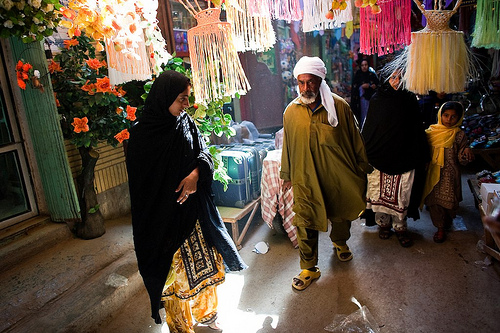Political Narratives, Fiction, and Reality
Political narratives allow us to come to grips with events, but they inevitably work to distort the truth.

Baloch people shop at the Chabahar bazaar in Iran. Balochistan, their home, is plagued by turbulence between Baloch 'insurrectionists' and Pakistani, Afghani, and Indian political influences. Photo: mishox via Flickr.
Three weekends ago Karachi hosted its fourth annual Literature Festival. This time the focus of the festival was much more political than in previous years. Panels that concentrated on non-fiction, rather than literature, drew the biggest crowds, and even those that discussed fiction had a political bent.

- Pakistan is a country of contradictions – full of promise for growth, modernity and progress, yet shrouded by political, social and cultural issues that undermine its quest for identity and integrity. My bi-monthly column “Pakistan Unveiled” presents stories that showcase the Pakistani struggle for freedom of expression, an end to censorship, and a more open and balanced society.

- Bina Shah is a Karachi-based journalist and fiction writer and has taught writing at the university level. She is the author of four novels and two collections of short stories. She is a columnist for two major English-language newspapers in Pakistan, The Dawn and The Express Tribune, and she has contributed to international newspapers including The Independent, The Guardian, and The International Herald Tribune. She is an alumnus of the International Writers Workshop (IWP 2011).
But as the Express Tribune noted in its editorial that discussed the event, “one cannot escape this, given the nature of Pakistan, and certainly Karachi, where politics is inextricably linked to life.”
This truism forces us to examine the difference between fiction and non-fiction, and how political narratives utilize both forms to influence public opinion and policy. A narrative is a spoken or written account of events, or, in short, a story. After every political or historical event occurs, a narrative is formed by governments, politicians, journalists, and witnesses to record the events and determine the course of future actions and policy, based on that narrative. One example of how this happens in modern-day Pakistan can be seen in the Balochistan conflict, and the contradictory political narratives that surround it.
Balochistan, Pakistan’s Western-most province, has been the scene of an armed struggle between government forces and Baloch insurrectionists, or freedom fighters (depending on whether you’re sympathetic to the government or not), for the past eight years.
According to the government’s narrative, these insurrectionists are funded and armed by antagonistic foreign powers—India and Afghanistan are the main suspects—to destroy Pakistan’s territorial integrity.
On the other hand, the anti-government rebels claim they are fighting to free Balochistan from the occupation of a foreign army, which bribes tribal lords to keep the population poor and undeveloped, in exchange for access to Balochistan’s priceless deposits of coal, oil, natural gas, and gold.
Which story is true?
Each version is based on actual events—armed clashes, nighttime sabotage, a guerilla war, and the influence of foreign powers—not to mention the geostrategic interests of Pakistan, its allies, and its foes. But what different lights these events are painted in to sway public opinion and drive diplomatic and military policy in sharply divergent directions!
One writer who has decided to pen his own narrative about the Balochistan situation is Muhammad Hanif, author of the best-selling novels A Case of Exploding Mangos and Our Lady of Alice Bhatti.
Hanif also worked as a journalist for BBC Urdu for many years, and drew on that experience to write his new book of non-fiction essays, titled The Baloch Who Is Not Missing and Others Who Are. Launched at the Karachi Literature Festival, the book addresses the families of the thousands of Baloch activists, intellectuals, and students who have gone missing over the past several years, supposedly kidnapped, tortured, and even killed by Pakistan’s secretive intelligence agencies.
Hanif’s book is meant to draw attention to this dark side of the struggle in Balochistan. The narrative he addresses is repeatedly raised by activists in favor of the Baloch fight for independence, but willfully ignored by the Pakistani government. Indeed, the government blocks websites pertaining to the situation in Balochistan and is said to be upholding the ban on YouTube for the same reason.
Penning this alternative narrative is a courageous move for a writer like Hanif who doesn’t necessarily have to put himself at risk of retaliation from intelligence authorities. Yet with approximately 15,000 people missing and 700 bullet-riddled bodies found in Balochistan, writers of conscience find themselves unable to ignore this story.
Some cases of political narrative seem clear-cut, but the majority contain more than a hint of fiction, no matter from which side of the conflict they originate. This is because, like the game Chinese whispers (or Telephone for those in the States), in the retelling, facts become distorted, sometimes on purpose, and sometimes just because human beings are unreliable narrators.
We need both a villain and a hero in our stories, but it’s vital to listen to multiple narratives and be able to discern reality from fiction. If we don’t, we risk having untruth crystalize into the version of events that best suits our needs, intentions, and purposes.





One Comment on "Political Narratives, Fiction, and Reality"
Good write up Bina. Look forward to reading your write ups on Samponiaway. 🙂